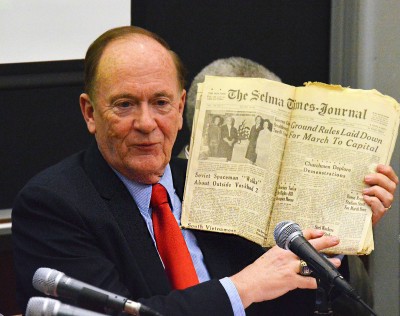
A panel of theologians convened Tuesday in Boston University’s School of Theology to reflect on the history of the civil rights movement in Selma, Alabama on its 50th anniversary in conjunction with the ongoing #BlackLivesMatter movement, as part of the Lowell Lecture: Selma at 50, Ferguson Today.
Approximately 70 BU students and Boston residents congregated for the lecture that featured STH alumnus Don Messer, Rev. William Bobby McClain and Rev. Pamela Lightsey, associate dean of community life at STH.
“[I’d like to welcome you to] a celebration and a mourning,” said STH dean Mary Elizabeth Moore. “Celebration for what courageous, justice-minded people did as they marched from Selma to Montgomery, mourning for what is yet to be done. Celebration for what courageous, justice-minded people have done in Ferguson, in New York and … throughout the U.S. and throughout the world, mourning for what is yet to be done.”
McClain, who was raised in Alabama, said he noticed at a young age at school that black people were limited in what they were allowed to do compared to white people.
“My teachers stressed the importance of the founding of America as a democracy and a government of the people, by the people and for the people,” he said. “Yet, none of our wonderful, educated, talented teachers … could register to vote. [They] couldn’t exercise that responsible citizenship and to marvel for us in the community that remarkable freedom they taught us about in the classroom.”
Messer said about 50 years ago, he and McClain traveled with 42 seminarians and students from STH to Selma for a weeklong trip. The seminarians took two buses and two cars, and students paid $40 for the bus fare and the cost equivalency of one month’s rent for housing.
He recalled a phone call with his typically supportive parents during his trip to Selma and how they expressed disapproval of his “demonstrating with that agitator Martin Luther King.”
“The ethos of racial superiority lurked in unexpected places and people,” he said. “Naively and idealistically, I had joined in the struggle for equality for all Americans, not realizing the depth that racism had impregnated white society, even my own family.”
The group was ultimately unable to participate in Selma’s Great March because the historic event was unexpectedly postponed, but Messer said he and the others still marched on two of the three days in nonviolent protest.
Lightsey recalled her own experience in Ferguson, Missouri in the aftermath of the shooting death of 18-year-old Michael Brown in August 2014.
“Some have asked how the killing of one black man in Ferguson ignited such a tumultuous turn of events,” she said. “Frankly, I feel that question is inaccurate. Black citizens in Ferguson and many other cities have been bearing an internal rage kindled by poverty and discrimination for quite some time.”
Brown, an unarmed black teenager, was shot and killed by white police officer Darren Wilson, causing violent protests in the immediate aftermath of his death and after the St. Louis County grand jury made the decision in November 2014 to not to indict Wilson for his actions.
Lightsey visited Ferguson in the first 21 days after Brown was killed, and again in November, on the day the grand jury decision was announced, she said. During her address, Lightsey showed footage she had taken during her visits. After seeing people being sprayed with pepper spray and tear gas, she said she thought, “not much has changed” since Selma.
“The connection can and should be made, from Dred Scott, to Selma, to Ferguson,” she said. “Black people in the United States have brought their demands before the legislative processes of our country. We must continue to push for justice through public policy, and I believe it is the work of activists then and now to see it to fruition.”
Several attendees said they were glad they were given the opportunity to have a conversation surrounding the civil rights movement, and they hope to make it a more prominent conversation among their peers.
Haley Jones, a graduate student in STH, said she agreed with the panelists’ belief that the church must take part in the civil rights conversation.
“We have to have those spaces in which we can have those really difficult conversations, and I don’t think we do that well yet,” she said. “There are so many ways that we can begin to do that, and we learn a lot of those here at the School of Theology.”
Ashley Johnson, 29, of Dorchester, said the panel discussion left the audience with the responsibility to step up and start the civil rights conversation among their own peers.
“I am an elementary school teacher, so this definitely has me thinking about what I do to teach our history,” she said. “I feel that very frequently we too, as teachers, are handed a curriculum of what we should teach and what we should read. There definitely needs to be a revolution of sorts in our schools and what is being taught in social studies classes and history classes, as well.”
Katie Omberg, a second-year graduate student in STH, said the people of the technological generation must figure out how they are going to be activists and speak out in favor of civil rights.
“Because this is the first generation to do this [activism] work with the Internet, we are still finding what our footing is,” she said. “There is a lot of talk about civil rights and about racism in the classroom, but there is not a lot of talk about the action items and what we are actually going to do about that.”

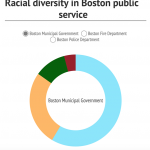
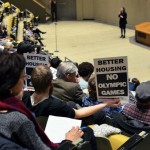
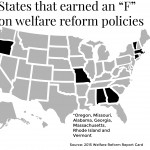
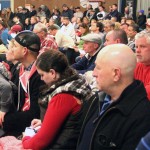










Ferguson should be giving rise to a serious conversation about the militarization of our law enforcement professionals and how quick they are to use deadly force but instead it has been turned into a cause celeb for racial discrimination.
If you are white and you really think Ferguson was about race I dare you go try punching a LEO in the face and right after you do that to try grabbing his gun!
What a great account of the Selma panel presentation at BU School of Theology. All of
the panelists are friends of mine, and as I read the story I was delighted by the responses of the students present. I have suggested that this week’s Selma Anniversary Event be about 3 things; 1. A response to the fact that in spite of the blood, sweat, tears and deaths that were a prelude to the Voting Rights Act, both the US Supreme Court and the Congress are whittling away portions of it. “The more things change, the more they remain the same”. 2. It was the cry of “states rights” that we in the Civil Rights Movement challenged. Today in Alabama, the states rights argument has surfaced again re; same sex marriage equality. I cannot imagine that this week’s Selma events would not take public note of that fact. Regardless of one’s faith-based opinion on same sex marriage, allowing resistance to Constitution-granted marriage equality for same sex couples to go unchallenged, opens the door for a return to a resistance to Constitution-granted racial equality. I cannot imagine those in Selma would not speak up and out on this. 3. The Justice challenge of the 21st century is income/economic inequality. My hope is that the students who heard, McClain, Messer and Lightsey, will be in the forefront of an Economic Rights Movement that will address the economic inequality of the 21st century that distorts the quality of education, healthcare, employment, home ownership, power and influence in today’s USA and the world. May the students of today, 50 years from now, gather to reflect on what they have done, what Movements they have initiated, as a response to what they heard and felt at the BU School of Theology Lowell Lectures in 2015.